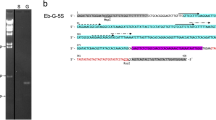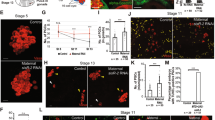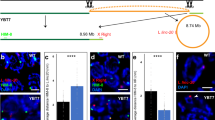Abstract
DURING the early determination of the blastomeres in the nematode Ascaris chromosomal segments are eliminated in the presomatic cells (chromatin diminution). In the germline, however, all the chromatin is preserved. Similar genome differentiation phenomena have been published1–3. Since no molecular description of chromatin diminution has been made we have begun to study the chromosomes in germline and somatic cells4. It was found that the amount of DNA occurring only in the germ-line chromosomes is not constant5 and that this DNA is not enriched in rDNA6. There is no evidence that the germline-limited DNA is transcribed in vivo7. The results presented here show that the germline DNA of Ascaris contains highly repetitive components, eliminated by the diminution process. Their possible molecular function in connection with germline–soma differentiation and chromosomal behaviour is discussed.
This is a preview of subscription content, access via your institution
Access options
Subscribe to this journal
Receive 51 print issues and online access
$199.00 per year
only $3.90 per issue
Buy this article
- Purchase on Springer Link
- Instant access to full article PDF
Prices may be subject to local taxes which are calculated during checkout
Similar content being viewed by others
References
Sager, R., and Kitchin, R., Science, 189, 426–433 (1975).
Woodcock, D. M., and Sibatani, A., Chromosoma, 50, 147–173 (1975).
Endow, S. A., and Gall, J. G., Chromosoma, 50, 175–192 (1975).
Moritz, K. B., Wilhelm Roux' Archiv., 159, 31–88 (1967).
Moritz, K. B., in Introduction to Quantitative Cytochemistry, II, (edit. by Wied, G. L., Bahr, G. F.), 57–75 (Academic, New York, 1970).
Tobler, H., Zulauf, E., and Kuhn, O., Devl Biol., 41, 218–223 (1974).
Moritz, K. B., Verhandl Deutsch. Zool. Ges., 36–42 (Fischer, Stuttgart, 1970).
Roth, G. E., Thesis, Univ. München (1973).
Bielka, H., Schultz, I., and Böttger, M., Biochim. biophys. Acta, 157, 209–212 (1968).
Tobler, H., Smith, K. D., and Ursprung, H., Devl Biol., 27, 190–203 (1972).
Wetmur, J. G., and Davidson, N., J. molec. Biol., 31, 349–370 (1968).
Laird, C. D., Chromosoma, 32, 378–406 (1971).
den Tonkelaar, E. M., and van Duijn, P., Histochemie, 4, 16–19 (1964).
Cech, T. R., Rosenfeld, A., and Hearst, J. E., J. molec. Biol., 81, 299–325 (1974).
Davidson, E. H., and Britten, R. J., Q. Rev. Biol., 48, 565–613 (1973).
Britten, R. J., Graham, D. E., and Neufeld, B. R., in Methods in Enzymology, 29, (edit. by Grossman, L., Moldave, K.), 363–418 (Academic, New York, 1974).
Boveri, T., Festschr. R. Hertwig, III, 133–214 (Fischer, Jena, 1910).
Moritz, K. B., Wilhelm Roux' Archiv., 159, 203–266 (1967).
Walker, P. M. B., Nature, 229, 306–308 (1971).
Author information
Authors and Affiliations
Rights and permissions
About this article
Cite this article
MORITZ, K., ROTH, G. Complexity of germline and somatic DNA in Ascaris. Nature 259, 55–57 (1976). https://doi.org/10.1038/259055a0
Received:
Accepted:
Issue Date:
DOI: https://doi.org/10.1038/259055a0
This article is cited by
-
Comparative transcriptome sequencing of germline and somatic tissues of the Ascaris suum gonad
BMC Genomics (2011)
-
Constitutive heterochromatin: a surprising variety of expressed sequences
Chromosoma (2009)
-
Drosophila melanogaster as a model for studying protein-encoding genes that are resident in constitutive heterochromatin
Heredity (2007)
-
A shotgun optical map of the entire Plasmodium falciparum genome
Nature Genetics (1999)
-
Nucleolar cycle and localization of NORs in early embryos of Parascaris univalens
Chromosoma (1995)
Comments
By submitting a comment you agree to abide by our Terms and Community Guidelines. If you find something abusive or that does not comply with our terms or guidelines please flag it as inappropriate.



